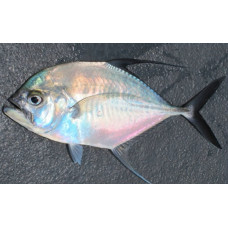Latin name
Ulua aurochs
Other names
Black-crested Trevally, Longraker Trevally, Mirror-mouthed Trevally.
Identification
There are many very long, feather-like gill stamens that protrude into the mouth along with the tongue. Older individuals also have a prominent chin that extends well beyond the upper jaw.
Features of fish fins
Ulua aurochs differs from Ulua mentalis in the length of the soft rays on the dorsal and anal fins.
Fish colouring
The body coloration is bluish to silvery blue, with broad scattered stripes on the sides, a shiny mirror silver inside the mouth and on the tongue, and a very long filament on the dorsal fin.
Distribution
Occurs in the Indo-Pacific region of the western and central Pacific Ocean. Its range extends from New Guinea, northern Australia, the Philippines and the Pacific Islands in the western and central Pacific Ocean.
Habitat
Marine; pelagic-neritic, tropical species.
Size
Adults can grow to 20 inches (50 centimeters).
Behavior
Adults inhabit coastal waters.
Food and feeding habits
Predatory fish that preys on small fish and invertebrates in waters above reefs and in the open sea. Juveniles feed on zooplankton.
Reproduction
Egg laying species, females lay eggs. During the breeding stage, females release a large number of eggs into the water, which are then fertilized by the males' sperm.
Fishing
Have a small commercial fishery.
Relationship with a person
Used for human consumption.
| Classification | |
| Phylum | Chordata |
| Class | Actinopterygii |
| Squad | Carangiformes |
| Family | Carangidae |
| Genus | Ulua |
| Species | U. aurochs |
| Features | |
| Conservation status | Least Concern |
| Habitat | Pelagic |
| Life span, years | No information |
| Maximum body weight, kg | No information |
| Maximum length, cm | 50 |
| Sailing speed, m/s | No information |
| Threat to people | Edible |
| Way of eating | Predator |
Silvermouth trevally
Tags: silvermouth trevally

